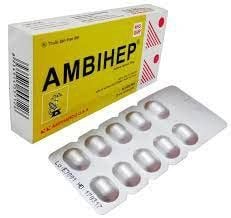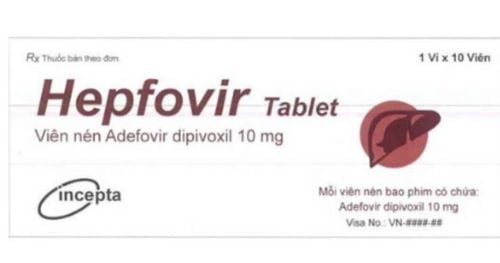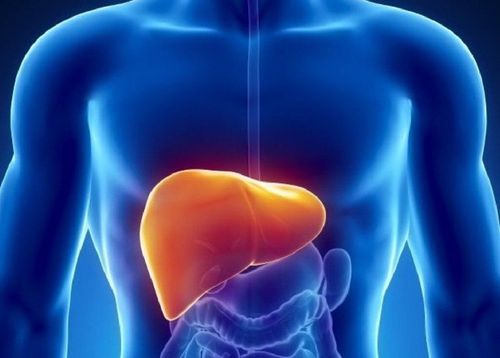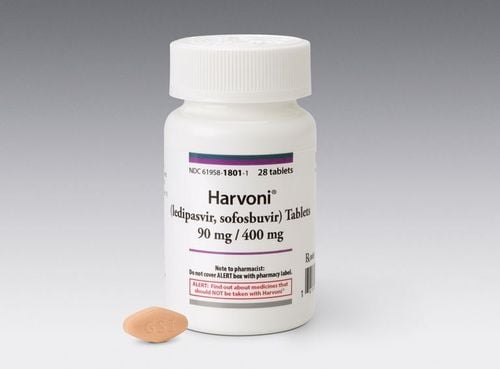This is an automatically translated article.
The goals of specific drugs for hepatitis B are to reduce the risk of disease progression, prevent hepatitis B from being passed on to others, and limit complications for the patient. Knowing the information will help the treatment process bring positive results.
1. Overview of specific hepatitis B drugs
Currently, the latest hepatitis B drugs include:
Pegylated interferon alfa (PEG-IFN-a); Entecavir (ETV); Tenofovir disoproxil fumarate (TDF); Tenofovir alafenamide (TAF). These are the major hepatitis B-specific drugs approved globally, although clinical trials are continuing to research and develop some more advanced drugs, such as:
Encapsidation inhibitors Inhibitors TLR7 agonists Vaccines The Centers for Disease Control and Prevention (CDC) recommends adults at risk for inflammatory disease Hepatitis B should be immunized with the hepatitis B vaccine. Meanwhile, this vaccine is a mandatory shot in the standard immunization schedule for children.
2. Interferons
Interferons are naturally produced proteins with antiviral, antitumor and immunomodulatory activities.
2.1. Peginterferon alfa 2a (Pegasys) Peginterferon alfa-2a binds to cell surface receptors in a series of protein interactions, resulting in gene duplication. These promoter genes inhibit viral replication in infected cells, cell proliferation, and immunomodulation. Peginterferon alfa-2a is indicated for adults with:
Hepatitis B antigen (HBeAg) positive HBeAg negative for chronic hepatitis B Mild cirrhosis With viral replication and hepatitis. For the treatment of chronic hepatitis C, the US Food and Drug Administration (FDA) also approved Peginterferon alfa-2a alone or in combination with ribavirin in previously untreated patients. with interferon alfa and have mild cirrhosis.
2.2. Interferon alfa-2b (Intron A) Interferon alfa-2b is a protein product produced by recombinant DNA technology. Although the mechanism of anticancer activity of this specific hepatitis B drug is still unknown, its direct antiproliferative effects, against malignant cells, and modulation of the host immune response have been demonstrated. considered to play an important role. The immunomodulatory effects of interferon alfa-2b include:
Enhancement of T-cell activity Stimulation of natural killer cell activity Amplification of human leukocyte antigen (HLA) proteins on cells infected Inhibits tumor cell proliferation. The direct antiviral activity of interferon alfa-2b activates viral ribonuclease hydrolytic enzymes, and also inhibits viral entry and replication into cells. This is considered to be the direct antimicrobial mechanism of this hepatitis B antiviral drug.
Before initiating treatment with interferon alfa-2b, the patient should have tests to quantify:
Peripheral hemoglobin Platelets Granulocytes Hair cells Bone marrow hair cells. During treatment, patients also need to be monitored monthly to determine the level of response to therapy. Discontinue treatment when the patient shows signs of unresponsiveness within 4 months. Otherwise, treatment should be continued until no further improvement is noticed. It is currently unclear whether continuing treatment for a longer period of time will be beneficial.
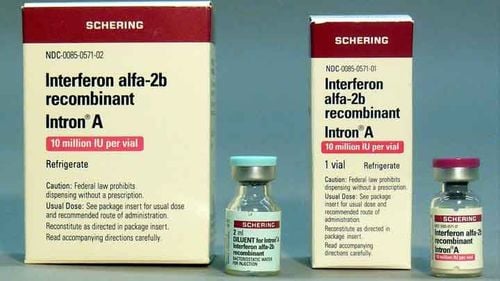
Interferon alfa-2b là một sản phẩm protein được sản xuất bằng công nghệ DNA tái tổ hợp
3. Hepatitis B antivirals and reverse transcriptase inhibitors
Hepatitis B antivirals work by interfering with viral replication, weakening or erasing their activity.
3.1. Tenofovir disoproxil fumarate (Viread) Tenofovir is a reverse transcriptase inhibitor similar to the nucleotide structural unit (adenosine monophosphate) and hepatitis B virus (HBV). Tenofovir can be used as:
First-line therapy for treatment-nave patients Add-on therapy in patients resistant to lamivudine, telbivudine or entecavir Alternative therapy in patients who have not responded adequately to adefovir, thanks to stronger antiviral activity. 3.2. Entecavir (Baraclude) Entecavir is also active against hepatitis B virus (HBV) polymerase analogous to nucleoside guanosine. This agent competes with the natural substrate deoxyguanosine triphosphate (dGTP) for the inhibition of HBV polymerase activity (i.e. reverse transcriptase). This hepatitis B antiviral is indicated for the treatment of chronic HBV infection and is available as both a tablet and an oral solution (0.05 mg/mL; 0.5 mg = 10 mL). However, Entecavir is less effective in patients with lamivudine-resistant HBV infection.
3.3. Lamivudine (Epivir, Epivir-HBV) Similar to thymidine, Lamivudine blocks viral replication by competitive inhibition of viral reverse transcriptase. There is evidence that an indirect immunomodulatory effect has occurred.
Compared with other oral hepatitis B drugs, lamivudine has a lower cost. However, other agents were superior to lamivudine in inhibiting viral replication (with the exception of adefovir). Another disadvantage of this therapy is the high rate of resistance. The role of lamivudine in the treatment of hepatitis B is diminishing as other alternative therapies emerge.
3.4. Adefovir dipivoxil (Hepsera) Adefovir is used to treat chronic hepatitis B. This agent is a prodrug that is converted to a diphosphate salt. The activity of this hepatitis B antiviral drug is classified as a nucleotide reverse transcriptase inhibitor. It inhibits hepatitis B virus (HBV) DNA polymerase (reverse transcription) by competing with the natural substrate deoxyadenosine triphosphate (dATP) and causing DNA strand termination after incorporation into viral DNA.
3.5. Telbivudine (Tyzeka) Telbivudine is an FDA-approved nucleoside analogue for the treatment of chronic hepatitis B. Hepatitis B specific drug Telbivudine inhibits hepatitis B virus DNA polymerase and is indicated in patients with:
Replicating hepatitis B virus Elevated aminotransferase activity Histological evidence of active liver disease. Consider telbivudine for patients who do not respond to interferon or cannot tolerate interferon. Resistance is a major drawback of this approach.
3.6. Tenofovir AF (Vemlidy) Tenofovir alafenamide (TAF) is both a nucleotide reverse transcriptase inhibitor (NRTI) and a phosphoramidate prodrug of tenofovir. Compared with tenofovir disoproxil fumarate (TDF), TAF is a form of tenofovir that has been shown to have high antiviral efficacy despite being administered at a dose 10 times lower than TDF. This hepatitis B antiviral also improved and became safer for the kidneys and bones. Tenofovir AF is indicated for the treatment of chronic HBV infection in adults with mild stage cirrhosis.
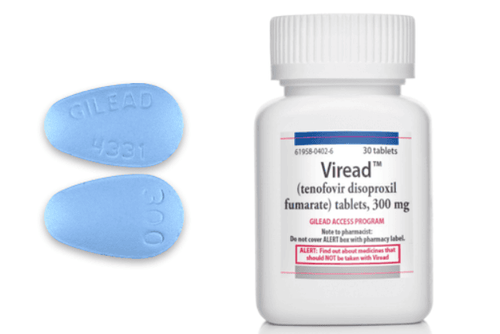
Tenofovir TAF vừa là chất ức chế men sao chép ngược nucleotide
4. Hepatitis B vaccine
Common hepatitis B vaccines are Engerix B, Heplisav-B, and Recombivax HB. They stimulate active immunity by developing antibodies to hepatitis B surface antigen (HBsAg). Hepatitis B vaccine is recommended by CDC for the following:
Adults at risk of HBV infection Infants born to HBsAg-negative mothers should be vaccinated within 24 hours of birth Infants with HBsAg-positive mothers should be vaccinated within 12 hours of birth Children and adolescents if not vaccinated at birth. According to the vaccination schedule, hepatitis B vaccine is divided into 2 groups:
3 doses in 6 months: Engerix B, Recombivax HB; 2 doses in 1 month: Heplisav-B (adults only). There is also a hepatitis A/B vaccine (Twinrix) that provides antibodies to HAV and HBV. Twinrix is indicated for immunization against hepatitis A virus disease and hepatitis B virus infection in adults 18 years of age and older.
Currently, Vinmec International General Hospital is providing a number of services and vaccines to prevent hepatitis, including:
Anti-Hepatitis B virus- Immunohbs 180UI/1ml (Italy) : Used for cases of exposure to people infected with hepatitis B virus or prevention of mother-to-child transmission, such as infants whose mothers are positive for hepatitis B virus, liver transplant recipients, people exposed to hepatitis B virus. Direct contact with blood of hepatitis B virus carriers... Simple hepatitis B vaccines such as Engerix B (GSK-Belgium), Euvax B (Sanofi Pasteur manufactured in Korea)... : Used Used for all ages, from infants to adults, usually injected according to the regimen 0,1.6 (the first dose is on day 0, the 2nd dose after 1 month and the 3rd dose is 5 months after the 2nd dose). or regimen 0,1,2,12 (3 consecutive injections 1 month apart, 4th dose 1 year apart from 3rd dose). Vaccines against hepatitis A alone such as Avaxim (Sanofi Pasteur - France), Havax (Vietnam): prevent hepatitis A with a 2-dose regimen 6-12 months apart. Hepatitis AB combination vaccine such as Twinrix (GSK-Belgium) is used in adults and children 1 year of age and older. In addition, there are hepatitis B vaccines combined with other antigenic components for use in children such as 5-in-1 vaccine (CombeFive, SII, Quinvaxem), 6-in-1 vaccine (Infanrix hexa, Hexaxim). To register for examination and treatment of hepatobiliary diseases at Vinmec International General Hospital, you can contact Vinmec Health System nationwide, or register for an online examination via the website.
Please dial HOTLINE for more information or register for an appointment HERE. Download MyVinmec app to make appointments faster and to manage your bookings easily.
Reference source: mayoclinic.org




